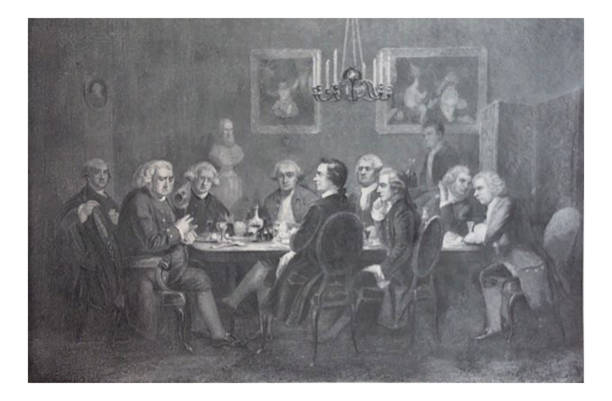
It’s easy for a long-time lefty like me to be irritated with David Brooks, but his Atlantic essay on his conservative journey from the Republican Party to the moderate wing of the Democrats is searching, honest, well-considered, and well-written. Sure there are questions and quibbles starting with “Who is Edmund Burke?” Burke was an 18th century Irish politician with a seat in the British House of Commons who famously opposed the French Revolution in Reflections on the Revolution in France, a book that has dropped out of favor that Burke is somewhat forgotten, but was long considered a classic in political theory. And how exactly does a legend of self-confidence like Teddy Roosevelt count as a conservative in the Burke suspicion of over-confidence and rapid change? But Brooks has a strong account of the many ways in which Trumpism represents the death of the conservative intellectual tradition.
I tweeted about the conservative intellectual tradition not being all that and wise guyed about titling a history of conservative theory with a small tribute to W.E.B. DuBois: “Shakespeare Winced: A History of Conservative Ideas,” In The Souls of Black Folk, W.E.B. DuBois wrote in opposition to white racist assumptions on his abilities.
“I sit with Shakespeare, and he winces not. Across the color line I move arm and arm with Balzac and Dumas, where smiling men and welcoming women glide in gilded halls. From out of the caves of evening that swing between the strong-limbed Earth and the tracery of stars, I summon Aristotle and Aurelius and what soul I will, and they come all graciously with no scorn nor condescension.
There’s not a conservative alive who can say the same.
For Brooks, Trump has conservative roots in the racism of figures like William F. Buckley, the super-charged individualism of the post-60’s era, and the sense of decline that developed during the Great Recession. He might have looked more closely at the “blood and soil” sensibility of anti-immigrant fervor and the over the top bigotry of the white conservative reaction to Obama. But Brooks views Trump as being just as “anti-conservative” as he is anti-liberal:
Both Burkean conservatism and Lockean liberalism were trying to find ways to gentle the human condition, to help society settle differences without resort to authoritarianism and violence. Trumpism is pre-Enlightenment. Trumpian authoritarianism doesn’t renounce holy war; it embraces holy war, assumes it is permanent, in fact seeks to make it so. In the Trumpian world, disputes are settled by raw power and intimidation. The Trumpian epistemology is to be anti-epistemology, to call into question the whole idea of truth, to utter whatever lie will help you get attention and power. Trumpism looks at the tender sentiments of sympathy as weakness. Might makes right.
Never Trumpers like Brooks weren’t the only ones responding to Trump though. The liberal/left that forms large majorities in the big cities and college towns, emerging majorities in the suburbs, and a steady minority presence in rural areas was aghast at Trump and even more aghast at the Trump voters among them. Following Adam Smith, Brooks stresses the role of “moral sentiments” in conservatism, “especially sympathy and benevolence,” sentiments that “move you to be outraged by cruelty, to care for your neighbor, to feel proper affection for your imperfect country.”
The moral sentiments of most Democrats have coalesced around both everyday support for equal treatment of black people, women, Hispanics, LGBT’s, and other ethnic and religious minorities and understanding of the many ways in which bigotries interact and reinforce each other. That’s the ethic of intersectionality that grew in close relation to the civil rights movement and it’s reflected in much of popular culture, education, corporate advertising, and the politics of the Democratic Party. Spread across the largest population centers and most ethnic groups in the U.S. the intersectionality or civil rights mentalité is mainstream American culture as well as the moral sense of the Democratic left. Concerning Trump, the outcome was a wave of moral revulsion first at Donald Trump, then at the people who voted for him, and finally at the Trump administration. In the case of white Democrats, people blocked Trump voters on facebook, cancelled right-wing relatives, and otherwise cut themselves off from camaraderie with people on the right. In many ways, the rejection of Trump and Trump voters confirmed Democrats in their civil rights mentalité and gave that moral sense more of a political edge.
David Brooks has moved into the moderate wing of the Democratic Party without really adapting the moral sense stemming from the civil rights movement of the 1950’s and 1960’s. He also fails to recognize the extent to which the Trump constituencies associated with the Republican Party have rejected the civil rights informed American cultural mainstream and developed a three-legged counter-culture of conspiracy theories, gun culture, and the religious right. Given that 85-90% of Trump voting Republicans are white, the Trump counter-culture is an extremely large and now insurrectionary white nationalist counter-culture that is a destabilizing force in American society and a threat to democratic institutions.
The emphasis on moral sentiments in the conservatism of David Brooks is instructive. The question is whether a house divided between two antagonistic sets of moral sentiments can still stand.